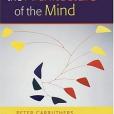《The Architecture of the Mind》是Oxford Univ Pr出版的圖書,作者是Carruthers, Peter
基本介紹
- ISBN:9780199207084
- 作者:Carruthers, Peter
- 出版社:Oxford Univ Pr
- 出版時間:2006年9月
- 頁數:480
- 定價:$ 169.50
- 裝幀:HRD
內容簡介
This book is a comprehensive development and defense of one of the guiding assumptions of evolutionary psychology: that the human mind is composed of a large number of semi-independent modules. The Architecture of the Mind has three main goals. One is to argue for massive mental modularity. Another is to answer a 'How possibly?' challenge to any such approach. The first part of...(展開全部) This book is a comprehensive development and defense of one of the guiding assumptions of evolutionary psychology: that the human mind is composed of a large number of semi-independent modules. The Architecture of the Mind has three main goals. One is to argue for massive mental modularity. Another is to answer a 'How possibly?' challenge to any such approach. The first part of the book lays out the positive case supporting massive modularity. It also outlines how the thesis should best be developed, and articulates the notion of 'module' that is in question. Then the second part of the book takes up the challenge of explaining how the sorts of flexibility and creativity that are distinctive of the human mind could possibly be grounded in the operations of a massive number of modules. Peter Carruthers's third aim is to show how the various components of the mind are likely to be linked and interact with one another - indeed, this is crucial to demonstrating how the human mind, together with its familiar capacities, can be underpinned by a massively modular set of mechanisms. He outlines and defends the basic framework of a perception / belief / desire / planning / motor-control architecture, as well as detailing the likely components and their modes of connectivity. Many specific claims about the place within this architecture of natural language, of a mind-reading system, and others are explained and motivated. A number of novel proposals are made in the course of these discussions, one of which is that creative human thought depends upon a prior kind of creativit

